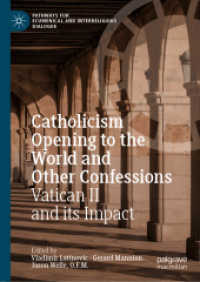- ホーム
- > 洋書
- > 英文書
- > Literary Criticism
Full Description
Taking its cue from recent theories of literary geography and fiction, Genealogical Fictions argues that narratives of familial decline shape the history of the modern novel, as well as the novel's relationship to history. Stories of families in crisis, Jobst Welge argues, reflect the experience of historical and social change in regions or nations perceived as "peripheral." Though geographically and temporally diverse, the novels Welge considers all demonstrate a relation among family and national history, genealogical succession, and generational experience, along with social change and modernization. Welge's wide-ranging comparative study focuses on the novels of the late nineteenth century, but it also includes detailed analyses of the pre-Victorian origin of the genealogical-historical novel and the evolution of similar themes in twentieth-century literature. Moving through time, he uncovers often-unsuspected novelistic continuities and international transformations and echoes, from Maria Edgeworth's Castle Rackrent, published in 1800, to G. Tomasi di Lampedusa's 1958 book Il Gattopardo.
By revealing the "family resemblance" of novels from Great Britain, Italy, Spain, Portugal, and Brazil, this volume shows how genealogical narratives take on special significance in contexts of cultural periphery. Welge links private and public histories, while simultaneously integrating detailed accounts of various literary fields across the globe. In combining theories of the novel, recent discussions of cultural geography, and new approaches to genealogical narratives, Genealogical Fictions addresses a significant part of European and Latin American literary history in which texts from different national cultures illuminate each other in unsuspected ways and reveal the repetition, as well as the variation, among them. This book should be of interest to students and scholars of comparative literature, world literature, and the history and theory of the modern novel.
Contents
List of Abbreviations
Acknowledgments
1. Introduction
2. Periphery and Genealogical Discontinuity: The Historical Novel of the Celtic Fringe (Maria Edgeworth and Walter Scott)
3. Progress and Pessimism: The Sicilian Novel of Verismo (Giovanni Verga and Federico De Roberto)
4. National and Genealogical Crisis: The Spanish Realist Novel (Benito Pérez Galdós)
5. Nature, Nation, and De-/Regeneration: The Spanish Regional Novel (Emilia Pardo Bazán)
6. Dissolution and Disillusion: The Novel of Portuguese Decline (Eça de Queirós)
7. Surface Change: A Brazilian Novel and the Problem of Historical Representation (Machado de Assis)
8. The Last of the Line: Foretold Decline in the Twentieth- Century Estate Novel (José Lins do Rego)
9. Death of a Prince, Birth of a Nation: Time, Place, and Modernity in a Sicilian Historical Novel (G. Tomasi di Lampedusa)
10. Epilogue: The Perspective from the End
Notes
Bibliography
Index








